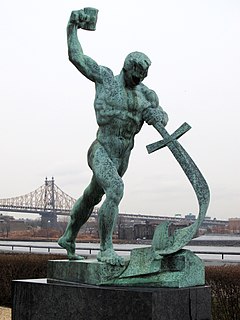Related Research Articles

The Treaty on the Non-Proliferation of Nuclear Weapons, commonly known as the Non-Proliferation Treaty or NPT, is an international treaty whose objective is to prevent the spread of nuclear weapons and weapons technology, to promote cooperation in the peaceful uses of nuclear energy, and to further the goal of achieving nuclear disarmament and general and complete disarmament. Between 1965 and 1968, the treaty was negotiated by the Eighteen Nation Committee on Disarmament, a United Nations-sponsored organization based in Geneva, Switzerland.

Nuclear disarmament is the act of reducing or eliminating nuclear weapons. It can also be the end state of a nuclear-weapons-free world, in which nuclear weapons are completely eliminated. The term denuclearization is also used to describe the process leading to complete nuclear disarmament.
Arms control is a term for international restrictions upon the development, production, stockpiling, proliferation and usage of small arms, conventional weapons, and weapons of mass destruction. Arms control is typically exercised through the use of diplomacy which seeks to impose such limitations upon consenting participants through international treaties and agreements, although it may also comprise efforts by a nation or group of nations to enforce limitations upon a non-consenting country.

A weapon of mass destruction (WMD) is a nuclear, radiological, chemical, biological, or any other weapon that can kill and bring significant harm to numerous individuals or cause great damage to artificial structures, natural structures, or the biosphere. The scope and usage of the term has evolved and been disputed, often signifying more politically than technically. Originally coined in reference to aerial bombing with chemical explosives during World War II, it has later come to refer to large-scale weaponry of warfare-related technologies, such as chemical, biological, radiological, or nuclear warfare.

Disarmament is the act of reducing, limiting, or abolishing weapons. Disarmament generally refers to a country's military or specific type of weaponry. Disarmament is often taken to mean total elimination of weapons of mass destruction, such as nuclear arms. General and Complete Disarmament was defined by the United Nations General Assembly as the elimination of all WMD, coupled with the “balanced reduction of armed forces and conventional armaments, based on the principle of undiminished security of the parties with a view to promoting or enhancing stability at a lower military level, taking into account the need of all States to protect their security.”

World War III or the Third World War, often abbreviated as WWIII or WW3, are names given to a hypothetical third worldwide large-scale military conflict after World War I and World War II. The term has been in use since at least as early as 1941. Some apply it loosely to limited or more minor conflicts such as the Cold War or the war on terror. In contrast, others assume that such a conflict would surpass prior world wars in both scope and destructive impact.

The nuclear arms race was an arms race competition for supremacy in nuclear warfare between the United States, the Soviet Union, and their respective allies during the Cold War. During this same period, in addition to the American and Soviet nuclear stockpiles, other countries developed nuclear weapons, though none engaged in warhead production on nearly the same scale as the two superpowers.

The Russian Federation is known to possess or have possessed three types of weapons of mass destruction: nuclear weapons, biological weapons, and chemical weapons. It is one of the five nuclear-weapon states recognized under the Treaty on the Non-Proliferation of Nuclear Weapons.

Stockholm International Peace Research Institute (SIPRI) is an international institute based in Stockholm. It was founded in 1966 and provides data, analysis and recommendations for armed conflict, military expenditure and arms trade as well as disarmament and arms control. The research is based on open sources and is directed to decision-makers, researchers, media and the interested public.

Pax Christi International is an international Catholic peace movement. The Pax Christi International website declares its mission is "to transform a world shaken by violence, terrorism, deepening inequalities, and global insecurity."

Jonathan Granoff is an American lawyer, screenwriter and lecturer, widely known as President of the Global Security Institute.

The International Campaign to Abolish Nuclear Weapons is a global civil society coalition working to promote adherence to and full implementation of the Treaty on the Prohibition of Nuclear Weapons. The campaign helped bring about this treaty. ICAN was launched in 2007 and counts 607 partner organizations in 106 countries as of 2021.
David Cortright is an American scholar and peace activist. He is Director of Policy Studies at the Kroc Institute for International Peace Studies at the University of Notre Dame and Chair of the Board of the Fourth Freedom Forum. Cortright has a long history of public advocacy for disarmament and the prevention of war.
Anti-nuclear organizations may oppose uranium mining, nuclear power, and/or nuclear weapons. Anti-nuclear groups have undertaken public protests and acts of civil disobedience which have included occupations of nuclear plant sites. Some of the most influential groups in the anti-nuclear movement have had members who were elite scientists, including several Nobel Laureates and many nuclear physicists.

A peace movement is a social movement which seeks to achieve ideals, such as the ending of a particular war or minimizing inter-human violence in a particular place or situation. They are often linked to the goal of achieving world peace. Some of the methods used to achieve these goals include advocacy of pacifism, nonviolent resistance, diplomacy, boycotts, peace camps, ethical consumerism, supporting anti-war political candidates, supporting legislation to remove profits from government contracts to the military–industrial complex, banning guns, creating tools for open government and transparency, direct democracy, supporting whistleblowers who expose war crimes or conspiracies to create wars, demonstrations, and political lobbying. The political cooperative is an example of an organization which seeks to merge all peace-movement and green organizations; they may have diverse goals, but have the common ideal of peace and humane sustainability. A concern of some peace activists is the challenge of attaining peace when those against peace often use violence as their means of communication and empowerment.

Global Zero is an international non-partisan group of 300 world leaders dedicated to achieving the elimination of nuclear weapons. The initiative, launched in December 2008, promotes a phased withdrawal and verification for the destruction of all devices held by official and unofficial members of the nuclear club. The Global Zero campaign works toward building an international consensus and a sustained global movement of leaders and citizens for the elimination of nuclear weapons.

Alyn (Alan) Ware is a New Zealand peace educator and campaigner in the areas of peace, non-violence, nuclear abolition, international law, women's rights, children's rights and the environment. He has served as the Global Coordinator for Parliamentarians for Nuclear Nonproliferation and Disarmament since it was founded in 2002.

Soviet Nuclear Threat Reduction Act of 1991, 22 U.S.C. § 2551, was chartered to amend the Arms Export Control Act enacting the transfer of Soviet military armaments and ordnances to NATO marking the conclusion of the Cold War. The Act sanctions the Soviet nuclear arsenal displacement shall be in conjunction with the implementation of the Treaty on Conventional Armed Forces in Europe. It funds the Nunn–Lugar Cooperative Threat Reduction program.

Professor Tilman Alfred Ruff is an Australian public health and infectious diseases physician who has focused his efforts on immunization and "the global health imperative to eradicate nuclear weapons."
Performers and Artists for Nuclear Disarmament (PAND)—alternatively called Performing Artists for Nuclear Disarmament—was a loose coalition of activist collectives made up of performers and artists. PAND chapters formed across the United States and Europe in the early 1980s to organize arts events, protest nuclear proliferation, raise funds to support peace and environmental causes, and heighten awareness of the threat of nuclear weapons. Several PAND chapters including the Cleveland and New York City collectives formed in 1982, a year when anti-nuclear activism culminated in the largest ever anti-war demonstration in support of the Second United Nations Special Session on Disarmament. The demonstration held in Central Park was attended by close to a million people.
References
- ↑ "The World March for Peace and Nonviolence" (PDF). World Without Wars and Without Violence. 2020.
- ↑ "Support the World March for Peace and Nonviolence". National Catholic Reporter. 2009-11-10. Retrieved 2022-03-12.
- ↑ Pennino, Debbie. "World March for Peace and Nonviolence – Library News" . Retrieved 2022-03-12.
- ↑ Staff (2009-10-02). "Global peace march kicks off". Vita (in Italian). Retrieved 2022-03-12.
- ↑ "Join the Second World March for Peace and Non-Violence! – WILPF" . Retrieved 2022-03-12.
- ↑ "World March for Peace and Nonviolence". Energia per i Diritti Umani onlus. Retrieved 2022-03-12.
- ↑ "Great Peace March for Global Nuclear Disarmament Records (DG 147), Swarthmore College Peace Collection". www.swarthmore.edu. Retrieved 2022-03-12.
- ↑ "LATIN AMERICA: Nuclear Disarmament Back on the Agenda - IPS ipsnews.net". ipsnews.net. 2012-03-05. Archived from the original on 2012-03-05. Retrieved 2022-03-12.